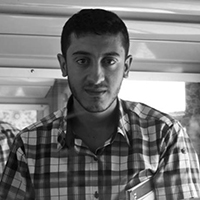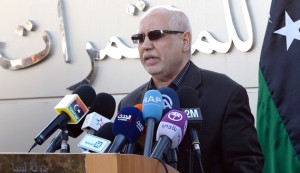The Pulse of the Middle East
On April 19, in the Moroccan coastal city of Skhirat, reports circulated that the Libyan crisis will end soon and positively. Bernardino Leon, the UN secretary-general’s special representative and head of the UN Support Mission in Libya, announced a major breakthrough in the new round of talks begun April 15 between the delegations of the Tripoli-based General National Congress (GNC) and the Tobruk-based parliament to discuss the formation of a national unity government.
Leon told reporters at the end of the dialogue round, “I can tell you that we have now a draft which looks like something very close to a final agreement. Eighty percent of the text is, let me put it this way, is something that the parties can agree [to].” Well-informed sources on the Skhirat dialogue told Al-Monitor that the two delegations will return in about two weeks to the Moroccan city to resume a new round of talks that might possibly be the last.
This news comes amid a continuing, heated Moroccan-Algerian diplomatic competition over which side will be at the forefront of the Libyan dialogue. Both Morocco and Algeria are trying to portray the dialogue hosted on its territory as the more important and legitimate “main dialogue.” Each is trying to present itself as a pivotal country in the region, capable of engaging as a mediator to resolve thorny political crises and conflicts. Algeria believes its security is threatened by the situation in Libya more so than any other country.
It seems clear that Morocco has succeeded in penetrating what had been a purely Algerian arena. Algiers had led the past negotiation rounds and hosted meetings among Libya’s neighbors — and gained the support of a number of foreign powers, including the United States. US-Moroccan harmony on developments in the Skhirat dialogue appeared during the meeting between the foreign ministers of the two countries in Washington on April 9, on the sidelines of the US-Morocco strategic dialogue, launched in September 2012.
It appears that Morocco has annoyed Algeria by involving itself in the Libyan crisis, sponsoring the official dialogue between the opposing parties after rounds of talks held in Geneva in January and Ghadames in February. Algeria had invested a lot of effort and time in the Libyan file, as it had been among the first countries to call for a dialogue, last fall.
This marks the second time that Algerian and Moroccan diplomats have collided about ongoing conflicts. This rivalry previously emerged during negotiations between warring Malian parties, with Moroccan diplomacy succeeding in getting closer than the Algerians had to the Azawad National Liberation Movement — which consistently rejected the proposals from the dialogue hosted by Algiers — after the historic visit by Awazad leader Bilal Ag Cherif to the palace in Marrakesh on Jan. 31, 2014.
Although Algerian officials usually avoid making official declarations about the conflict over hosting the Libyan dialogue, the Algerian position is usually disseminated through newspapers close to the government or through former officials, such as when Abdulaziz Rahabi, a former communications minister, told El-Khabar on March 5, “Morocco is isolated by virtue of its geographic location, and it has no borders except with Algeria and the Western Sahara. From the geopolitical perspective, Morocco cannot play a regional role, so it tries to compensate by playing a helper role for the benefit of the great powers.”
Immediately after Skhirat was selected as the new venue for the UN-sponsored talks, Algeria announced that it had been hosting secret talks that it claimed had brought together, for the first time, nearly 200 Libyan politicians from the various parties to the conflict. Algeria then began hosting meetings of Libyan political party leaders before each round of the talks held in Skhirat.
The competition between Algeria and Morocco is reflected in statements by the two countries’ foreign ministers, Ramtane Lamamra and Salaheddine Mezouar, respectively, about the dialogue rounds. Both countries send a message to the other when they repeatedly express public confidence that the dialogue hosted on its territory will succeed.
Algerian political analyst Hada Hazam told Al-Monitor that the recent round of talks between Libyan political parties in Algeria has made significant progress, which she described as the most important since the beginning of the negotiations in mid-January in Geneva, despite the pressure exerted by Morocco on some Libyan parties not to attend the Algeria gatherings.
Hazam said he thought Algeria has a better view of the crisis than Morocco does. “Unlike Morocco, [Algeria] did not approve the military intervention to overthrow the [Moammar] Gadhafi regime. [Algeria] is more concerned than Morocco in finding a solution to the crisis as soon as possible. [The Libyan] conflict impacts [Algeria’s] internal security as [Algeria] is Libya’s neighbor and shares with it more than 900 kilometers [560 miles] of border. The monitoring of [the border] to prevent the entry of weapons and terrorist groups requires enormous effort and money. So, unlike Morocco, [Algeria] is directly concerned in what happens in Libya.”
A source from the Tobruk parliament delegation to the Skhirat dialogue, speaking on condition of anonymity, told Al-Monitor, “The Algeria dialogue is only part of parallel dialogues. The dialogue that the [UN] relies on is the Morocco dialogue.”
Libyan journalist and political analyst Ali Awhida agrees with the assessment that the Morocco dialogue is the logical continuation of the Ghadames and Geneva talks. Awhida told Al-Monitor, “The dialogue going on in Morocco is the only possible and most credible dialogue because it represents the conflict’s two actual forces. But its success is difficult for several reasons, most notably because the UN has locked itself into a solution prepared in advance for the crisis and did not leave it to the parties to formulate their own perceptions.”
Awhida added, “The Algeria dialogue is a ‘dialogue of the deaf’ because it includes figures who have no representation on the ground and who provide no additional effective value to resolve the crisis in a sustainable manner. [The Algerian dialogue] also reflects a will to impose a specific approach on the Libyans by allowing the participation of militia leaders who are considered outcasts.”
Mohammed al-Nashtawi, a professor of international relations at Cadi Ayyad University in Morocco (also known as the University of Marrakech), attributes the rivalry between the two countries to Algerian diplomacy, feeling that with the fourth term of President Abdelaziz Bouteflika (and possibly years earlier because of his illness) it began losing its momentum and direction. Algeria had prided itself for its diplomatic efforts in the 1970s and 1980s.
Nashtawi told Al-Monitor, “In contrast, Moroccan diplomacy is quiet as it tries to encircle Algeria in Africa, especially in the Sahel and Sahara region in Mali, the Ivory Coast, Central Africa and in Yemen through its support and participation in Operation Decisive Storm, heeding the call of the Gulf states and moving closer to them at the expense of Algeria, which has remained indifferent. I think that Morocco’s role in the Libyan crisis might be an awakening of Moroccan diplomacy, even if belated. [Morocco may be trying to exploit Bouteflika’s] illness and the deadlock in the Algerian regime amid the fear felt by the Algerian military toward the Algerian elite regarding the post-Bouteflika period.”
Imad Stitou is a Moroccan writer and journalist. He worked as a journalist and specialized in investigative journalism in the al-Aan and Hespress magazines and al-Massae newspaper in Morocco. He also worked as a correspondent for a number of Arab newspapers in Morocco, most notably London’s Al-Quds Al-Arabi and the Lebanese News. He is an opinion writer for Radio Netherlands Worldwide website. He made the short-list for the Arab journalism award for youth in 2014 and has several articles published in Arabic cultural, literary and research magazines.








